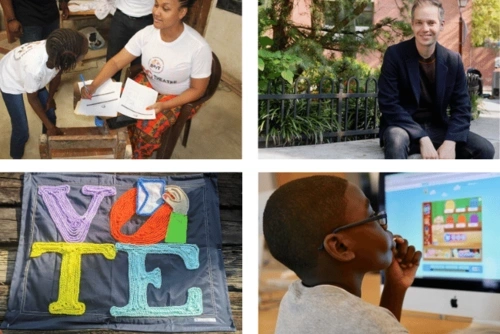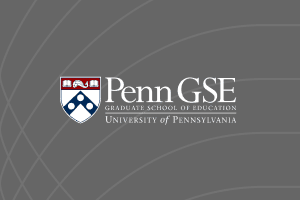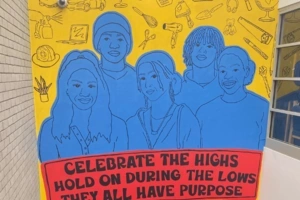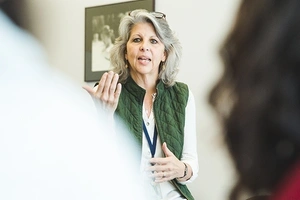
When people look back on 2020, they will think of how COVID-19 transformed their lives.
While the pandemic brought major changes to Penn GSE, including fully remote instruction, COVID was not our only story worth remembering. Here are a dozen more before we turn the calendar to 2021.
Laura Perna testifies before Pa Higher Education Funding Commission
“We can’t get to where we need to be in terms of educational attainment without closing the gaps — and we have some really big gaps.”
That’s what Laura Perna told Pennsylvania’s Higher Education Funding Commission when asked to testify as an expert witness January 8. She added that unless the Commonwealth can find ways to expand access and support for minorities, low-income students, and adult learners; lower barriers between institutions; and make it easier for families to understand the cost of college, residents and businesses will continue to struggle.
Since then, Pennsylvania lawmakers and colleges have continued to discuss how the state model might change. And this summer, Perna took on a new role as Penn’s Vice Provost for Faculty.
The coronavirus may force American schools to teach online. Are they ready?
This interview with Ryan Baker is a time capsule from the moment when we knew the pandemic was coming but before schools and society were locked down for the first time in many parts of the country.
Baker spoke about what could happen in a massive shift toward virtual learning. Some of his predictions and fears were borne out. There is still hope that others, like making more use of adaptive learning programs, could be more widely implemented.
Jasmine Blanks Jones knows how the arts can become a tool to fight a pandemic. The doctoral student in Penn GSE’s Education, Culture, and Society program and Penn’s Africana Studies department and the B4 Youth Theater she founded in Libera wrote and acted in plays that combatted misinformation during the Ebola outbreak there.
When COVID-19 appeared in Europe, B4 Theater’s youth actors and playwrights sprang into action, safely recording video skits with the facts about the virus.
“People are afraid and anxious,” Blanks Jones said. “Those are things the theater can directly address because they connect on the level of human emotion.”
Daris McInnis, Penn GSE doctoral student and Army vet, named a Tillman Scholar
When you hear McInnis tell it, his progression from the Army, to a pre-K teacher, to a doctoral student who wants to make sure every child has a caring early literacy education is natural rather than surprising.
“I want to remind folks of the playfulness, the softness, that should be there for every young child,” McInnis said. “And I think that should be there for kids beyond early childhood. They need that constant love and reassuring.”
McInnis is the first Penn GSE student, and is believed to be the first Black Penn student, to be named a Tillman Scholar. Later in the year, he gave the Educators Playbook for Parents 14 activities for building literacy at home.
During a summer of calls for racial justice, Howard Stevenson’s voice is heard
After the police killings of George Floyd, Breonna Taylor, and other Black Americans triggered protests across the country, Stevenson’s expertise on racial literacy and healing from trauma was needed more than ever.
In a series of interviews with NBC News, the Philadelphia Inquirer, Vox, and others, Stevenson gave advice for how parents can talk to their kids about racism, shared tips on what teachers can do, and suggested that now is the time to have an open conversation.
“You’re always communicating about race,” Stevenson said, “whether you talk about it or not.”
A podcast speaking to parents’ needs
As if she wasn’t busy enough as a researcher and co-director of Penn GSE’s International Educational Development Program, Ameena Ghaffar-Kucher launched The Parent Scoop podcast in 2020.
While covering everything from homeschooling, to media literacy, to grief, to food, Ghaffar-Kucher has brought together academic experts and star-studded guests, including Claudine Boulstridge, the home recipe tester for world renowned chef, Yotam Ottolenghi, and Amna Nawaz, a Senior National Correspondent and the primary substitute anchor for PBS NewsHour
Give it a listen. You’ll then want to subscribe, give a five-star rating, and leave a comment. Trust us.
Rebecca Maynard and Brooks Bowden bring prestigious IES grants to Penn GSE
Maynard and Bowden will lead the Predoctoral Training Program in Interdisciplinary Methods for Field-Based Research in Education. This $4.5 million project will prepare doctoral student fellows, drawn from across the Penn campus, to conduct research that informs education policy and practice.
A separate $799,847 grant will fund a series of training programs led by Bowden that will prepare researchers and analysts at state and local agencies to examine the cost effectiveness of education interventions.
“I am so proud that IES has chosen to bring these programs to Penn GSE,” said Dean Pam Grossman. “Rebecca and Brooks are creating programs that will give a new wave of scholars the tools to answer crucial questions about how we can improve education for every child.”
And our next story even features a Predoctoral Training Program alum…
Gottfried drove across the country this summer on his way to become the newest professor in Penn GSE’s Education Policy division. We talked to him about returning to Penn, where he earned his PhD at Wharton, his favorite foods, and what’s next in his research agenda.
“I'm excited about thinking about opportunities to explore how other sectors of the community might be affecting children at school,” Gottfried said. “I think that questions pertaining to health services and its intersection with schooling would be particularly interesting. I think this will be especially important as our world progresses with COVID-19. How can schools best address health issues in the future?”
What a virtual pandemic can teach kids about the spread of viruses and staying safe
As COVID-19 spread around the world, Penn GSE’s Yasmin Kafai and her team from Utah State University and CalPoly Pomona saw a chance to help kids understand the pandemic and how to stay safe. They created SPIKEY-20, a non-fatal illness that afflicted citizens in Whyville, a virtual community designed to promote creativity and learning in kids and teens.
“Students will be able to follow the community spread, run simulations, practice preventive behavior, and write about their experiences with this virtual epidemic as well as with COVID in real life,” Kafai said.
Three educators celebrated at Penn GSE as winners of the 2020 McGraw Prize in Education
In February, the University of Pennsylvania became the new home for the Harold W. McGraw Jr. Prize in Education, one of the most prestigious prizes in the field.
Estela Mara Bensimon, Michelene (Micki) Chi, and Joseph S. Krajcik were honored as this year’s winners at a virtual gala in October for their achievements in higher education, learning science research, and pre-K-12 education, respectively. Each of the awardees received $50,000.
“We applaud teachers everywhere who share the common bond of inspiring others to learn and to grow,” said Penn President Amy Gutmann. “Excellence in education is the single most powerful force for understanding and for change. And, so, innovation in education must be our future.”
Talking to your kids about politics
Just before Americans went to the polls in November, Penn GSE’s Caroline Watts shared some tips for how parents could talk to kids about the results. Her advice proved useful as the country waited for a winner to be formally declared.
Even with the election settled, it’s still relevant. Like this:
“Try reframing how you talk about politics and current events. What are your core values, and why do you believe them? Why do these issues matter for the country? In addition to voting, what can you do to advance these goals and values?
“Believe it or not, talking to your kids in these terms can actually help you manage your feelings.”
Education in times of change: Penn GSE provides leadership and partnership for an unprecedented era
Amid the worst pandemic in a century and perhaps the largest civil rights movement in U.S. history, the field of education is operating in a dramatic and unprecedented environment. Across K–12 and higher education, the abrupt shift to virtual education during tumultuous times has brought vast challenges and opportunities related to learning, mental health, access, and equity. In this landscape, Penn GSE has applied its expertise to move education forward within the School, across the nation, and around the world.
“I have been incredibly proud of how Penn GSE has responded, in terms of orchestrating our own move to remote teaching, stepping up to provide resources to educators and leaders in the field at large, and addressing issues of race, equity, and access throughout our work,” said Penn GSE Dean Pam Grossman.


